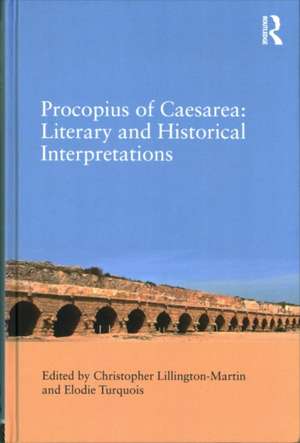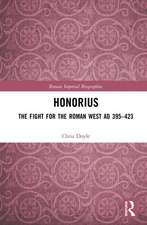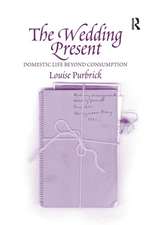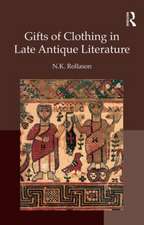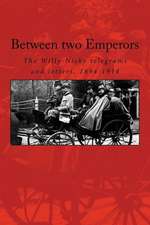Procopius of Caesarea: Literary and Historical Interpretations
Editat de Christopher Lillington-Martinen Limba Engleză Hardback – 29 iun 2017
This volume capitalises on the renaissance in Procopius-related studies by showcasing recent work on Procopius in all its diversity and vibrancy. It offers approaches that shed new light on Procopius’ texts by comparing them with a variety of relevant textual sources. In particular, the volume pays close attention to the text and examines what it achieves as a literary work and what it says as an historical product.
| Toate formatele și edițiile | Preț | Express |
|---|---|---|
| Paperback (1) | 389.05 lei 6-8 săpt. | |
| Taylor & Francis – 12 dec 2019 | 389.05 lei 6-8 săpt. | |
| Hardback (1) | 768.69 lei 6-8 săpt. | |
| Taylor & Francis – 29 iun 2017 | 768.69 lei 6-8 săpt. |
Preț: 768.69 lei
Preț vechi: 1105.44 lei
-30% Nou
Puncte Express: 1153
Preț estimativ în valută:
147.08€ • 153.58$ • 121.46£
147.08€ • 153.58$ • 121.46£
Carte tipărită la comandă
Livrare economică 15-29 aprilie
Preluare comenzi: 021 569.72.76
Specificații
ISBN-13: 9781472466044
ISBN-10: 1472466047
Pagini: 316
Ilustrații: 13
Dimensiuni: 156 x 234 x 24 mm
Greutate: 0.7 kg
Ediția:1
Editura: Taylor & Francis
Colecția Routledge
Locul publicării:Oxford, United Kingdom
ISBN-10: 1472466047
Pagini: 316
Ilustrații: 13
Dimensiuni: 156 x 234 x 24 mm
Greutate: 0.7 kg
Ediția:1
Editura: Taylor & Francis
Colecția Routledge
Locul publicării:Oxford, United Kingdom
Public țintă
PostgraduateCuprins
Introduction
I. Revisiting Procopius
1. Writing about Procopius – then and now
Averil Cameron
2. The Greatness of Procopius
Michael Whitby
3. The wor(l)ds of Procopius
Peter Van Nuffelen
II. Literary Tropes
4. How to interpret Procopius’ preface to the Wars
Franco Basso and Geoffrey Greatrex
5. Narrator and Participant in Procopius’ Wars
Alan Ross
III. Persian Wars
6. Exploring the structure of Persian Wars: amplification in Procopius’ narrative
Lyvia Vasconcelos Baptista
7. Procopius and Boethius: Christian Philosophy in the Persian Wars
James Murray
IV. Characterisation
8. Procopius and the Characterization of Bessas: Where History Meets Historiography
Conor Whately
9. Reinventing Theoderic in Procopius’ Gothic War
Charles Pazdernik
V. Military and Legal History Comparisons
10. Procopius, πάρεδρος / quaestor, Codex Justinianus, I.27 and Belisarius’ strategy in the
Mediterranean
Christopher Lillington-Martin
11. Justinian’s Laws and Procopius’ Wars
Marion Kruse
12. Comparing Procopius and Malalas
Ian Colvin
VI. Social History Comparisons
13. Roman or Barbarian? Ethnic Identities and Political Loyalties in the Balkans according to Procopius
Alexander Sarantis
14. Landownership and Rural Society in the Writings of Procopius
Peter Sarris
VII. Receptions
15. Scaliger’s Lie? A Note on "Project Procopius"
Federico Montinaro
VIII. The Aftermath
16. Epilogue
Anthony Kaldellis
Bibliography
I. Revisiting Procopius
1. Writing about Procopius – then and now
Averil Cameron
2. The Greatness of Procopius
Michael Whitby
3. The wor(l)ds of Procopius
Peter Van Nuffelen
II. Literary Tropes
4. How to interpret Procopius’ preface to the Wars
Franco Basso and Geoffrey Greatrex
5. Narrator and Participant in Procopius’ Wars
Alan Ross
III. Persian Wars
6. Exploring the structure of Persian Wars: amplification in Procopius’ narrative
Lyvia Vasconcelos Baptista
7. Procopius and Boethius: Christian Philosophy in the Persian Wars
James Murray
IV. Characterisation
8. Procopius and the Characterization of Bessas: Where History Meets Historiography
Conor Whately
9. Reinventing Theoderic in Procopius’ Gothic War
Charles Pazdernik
V. Military and Legal History Comparisons
10. Procopius, πάρεδρος / quaestor, Codex Justinianus, I.27 and Belisarius’ strategy in the
Mediterranean
Christopher Lillington-Martin
11. Justinian’s Laws and Procopius’ Wars
Marion Kruse
12. Comparing Procopius and Malalas
Ian Colvin
VI. Social History Comparisons
13. Roman or Barbarian? Ethnic Identities and Political Loyalties in the Balkans according to Procopius
Alexander Sarantis
14. Landownership and Rural Society in the Writings of Procopius
Peter Sarris
VII. Receptions
15. Scaliger’s Lie? A Note on "Project Procopius"
Federico Montinaro
VIII. The Aftermath
16. Epilogue
Anthony Kaldellis
Bibliography
Notă biografică
Christopher Lillington-Martin undertook postgraduate research, specialising in Late Antiquity, at Oxford and Reading Universities after studying at Wales (Swansea), Barcelona and Bristol Universities. He has published Procopius-related research on Dara and Rome, Belisarius and the Goths. He participates in late antique archaeology projects (e.g. Pollentia, Mallorca), is a member of the Oxford Centre for Late Antiquity, Corpus Christi College, Oxford, and a Visitor of Pembroke College, Cambridge.
Elodie Turquois completed a DPhil in Classical Languages and Literature at St Hugh’s College, Oxford, in 2013 after receiving an undergraduate degree in Classics at the Sorbonne in Paris. Her dissertation was a typology of the material and the visual across all of Procopius’ works. Her work focuses on the representation of material culture in literature, literary theory and reception, rhetoric and technical writing.
Elodie Turquois completed a DPhil in Classical Languages and Literature at St Hugh’s College, Oxford, in 2013 after receiving an undergraduate degree in Classics at the Sorbonne in Paris. Her dissertation was a typology of the material and the visual across all of Procopius’ works. Her work focuses on the representation of material culture in literature, literary theory and reception, rhetoric and technical writing.
Descriere
This volume aims to encourage dialogue and collaboration between international scholars by presenting new literary and historical interpretations of the sixth-century writer Procopius of Caesarea, the major historian of Justinian’s reign.
This volume capitalises on the renaissance in Procopius-related studies by showcasing recent work on Procopius in all its diversity and vibrancy. It offers approaches that shed new light on Procopius’ texts by comparing them with a variety of relevant textual sources. In particular, the volume pays close attention to the text and examines what it achieves as a literary work and what it says as an historical product.
This volume capitalises on the renaissance in Procopius-related studies by showcasing recent work on Procopius in all its diversity and vibrancy. It offers approaches that shed new light on Procopius’ texts by comparing them with a variety of relevant textual sources. In particular, the volume pays close attention to the text and examines what it achieves as a literary work and what it says as an historical product.
